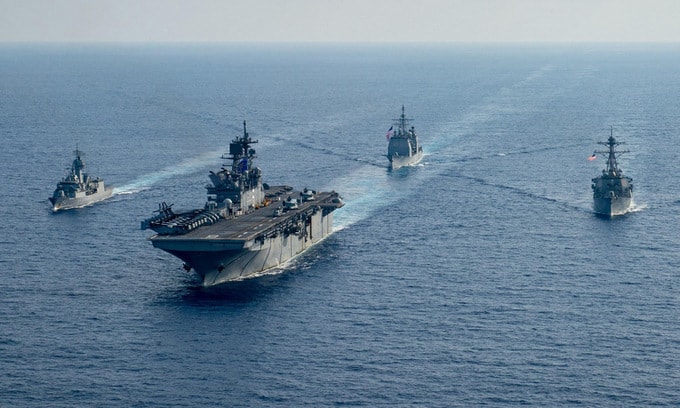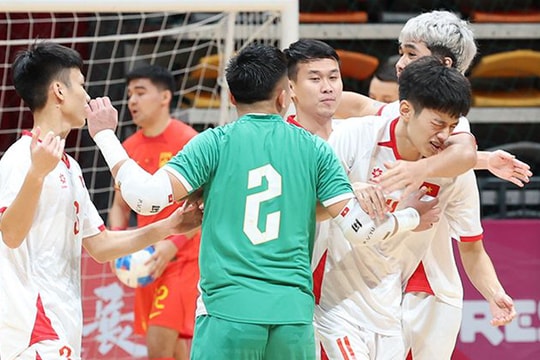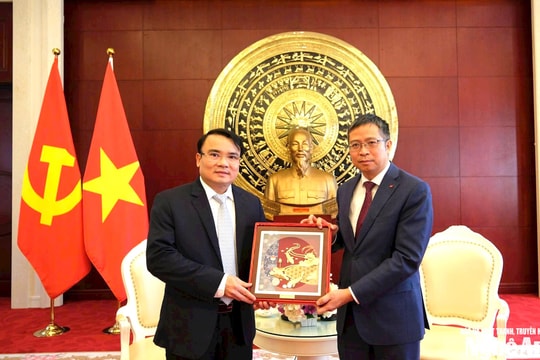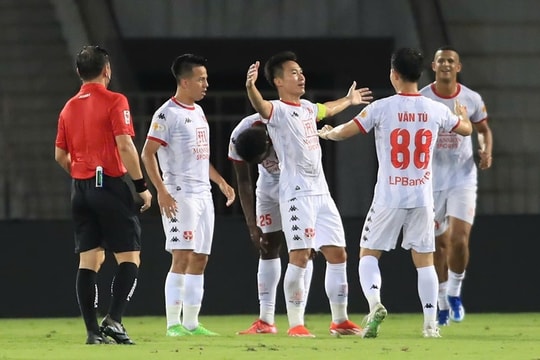China's calculations in stirring up the East Sea amid Covid-19
China may have expected countries to react weakly to it in the South China Sea due to the Covid-19 pandemic, but Beijing was wrong, experts say.
"China may believe that some countries involved will react weakly to Beijing's activities in the East Sea, as they are busy dealing with Covid-19. From there, China will strengthen its claims," Dr. Collin Koh Swee Lean, an expert at the S. Rajaratnam School of International Studies, Singapore (RSIS), toldVnExpresson China's recent actions.
On April 18, China announced the establishment of the so-called "Xisha District", namely Vietnam's Hoang Sa archipelago, and "Nansha District", namely Vietnam's Truong Sa archipelago, in "Sansha City", to manage the Hoang Sa archipelago, Macclesfield Bank, and the Truong Sa archipelago and surrounding waters.
On April 17, the Chinese geological survey ship Haiyang 8 followed the drilling ship West Capella operated by the Malaysian oil and gas company Petronas in the East Sea, after appearing 158 km off the coast of Vietnam, within Vietnam's exclusive economic zone (EEZ). Previously, on April 2, a Chinese ship sank a Vietnamese fishing boat with 8 fishermen operating normally in the area of Phu Lam Island, waters belonging to Vietnam's Hoang Sa archipelago.
 |
| US and Australian warships conduct exercises in the East Sea on April 18. Photo:US Navy |
However, in reality, Vietnam has been quick to respond to Beijing’s actions. On April 19, Hanoi strongly protested the establishment of the so-called “Xisha and Nansha districts”, demanding that China cancel its wrongful decisions and respect Vietnam’s sovereignty over the Spratly and Paracel Islands.
Hanoi affirmed that it is always closely following the situation in the East Sea, after receiving information that the Haiyang Dizhi 8 group of ships entered the EEZ. Vietnam believes that China has caused property damage, threatened the safety of lives and legitimate interests of Vietnamese fishermen in Hoang Sa, and asked Beijing to compensate.
The Philippines on April 8 expressed deep concern after China sank a Vietnamese fishing boat, warning that similar actions would "erode trust" between Beijing and countries in the region.
Outside the region, the US, Japan and Australia have repeatedly reacted strongly to China. Washington expressed "extreme concern" when Beijing rammed a Vietnamese fishing boat, demanded that China stop bullying its neighbors, and sent warships to the East Sea to patrol to promote freedom of navigation at sea. Australian warships also participated in exercises with the US to affirm their commitment to ensuring an open and free Indo-Pacific region, before the foreign minister condemned Beijing. Japanese Foreign Minister Toshimitsu Motegi raised concerns about the "two new districts" that China established.
"The statements from the US and Australia, along with the actions of their warships, show a strong reaction from these countries to China," Collin said.
According to Professor Robert Ross of Harvard University, the US sent ships to the East Sea to show that its navy still maintains a large presence in the region. "Washington cannot ignore Beijing's naval mobilization," he said.
China's actions to stir up the East Sea take place when Vietnam and other countries around the world are struggling to prevent Covid-19.
The epidemic, which originated in Wuhan, Hubei Province, China, late last year, has now spread around the world, infecting more than 2.7 million people and killing more than 190,000. Southeast Asia has recorded more than 33,300 cases and more than 1,200 deaths. The total number of infections in the US, Japan, and Australia has also increased.
As a close follower of developments in the East Sea, Gregory Poling, Center for Strategic and International Studies (CSIS), USA, assessed that China's recent actions are nothing new, and are part of Beijing's long-term strategy.
"What China is doing is similar to what they did before Covid-19. However,It is outrageous that Beijing continues to behave this way when countries are struggling to cope with the epidemic."," Poling said, noting that China is partly at fault for allowing the outbreak to begin.
Assessing China's intentions going forward,Poling believes that Beijing will continue to harass oil and gas exploration and fishing activities of countries in the region.
“China will push until countries feel that oil exploration and fishing are too risky, too costly, and they have to accept Chinese control of the sea,” Poling said.
Professor Robert Ross, Harvard University, said that China sent the HD 8 ship into Malaysia's EEZ without giving any reason. Beijing repeated the EEZ violation as it did with Vietnam in 2019, to make it a regular activity.
"In the long term, China wants countries in the region to gradually get used to Beijing's ships entering their EEZs, not seeing it as a controversial issue anymore," Ross said.
According to Professor Carl Thayer, Australian Defense Force Academy, University of New South Wales, the new point in China's plot to control the East Sea is that Beijing has reduced the frequency of mentioning the "Nine-dash line" and strengthened the concept of the Four Sha, although the nature of the claim has not changed.
In recent notes sent to the United Nations, China claimed "sovereignty" over the archipelagos in the East Sea, including Dongsha, Xisha, Zhongsha and Nansha. In which, Nansha and Xisha are the names China uses for the Truong Sa and Hoang Sa archipelagos of Vietnam.
"China has made the Four Sha claims and used vague concepts of related maritime zones in the South China Sea to occupy these areas," Thayer said.
Forecasting upcoming developments,Professor Ross said that China would not want to escalate tensions into conflict in the East Sea, but put pressure on countries in the East Sea to remind them that "it is necessary to adjust to Beijing's rise".
Thayer predicts that China will pursue a "two-pronged" diplomatic policy with Vietnam and ASEAN countries. One is that China will put pressure on countries in the region when it feels its claims are being challenged. The other is to promote "mask diplomacy" with ASEAN to fight Covid-19.
"Therefore, it is unlikely that China will unilaterally escalate in the South China Sea," Thayer said.
According to Derek Grossman, senior defense analyst at the Rand Corporation, the situation in the East Sea will only "suddenly change" if China declares an air defense identification zone (ADIZ) or permanently deploys fighter jets in the Spratly Islands. This year, China will continue to increase its activities to assert its claims in the East Sea, promoting patrols and exercises.
China may become more aggressive in the South China Sea by the end of 2020 if the US fails to control Covid-19 and other internal issues, according to Peter Layton of Griffith University, Australia. The purpose is to show off its military power.
During the year Vietnam chaired ASEANCollin said that Hanoi needs to maintain discussions on the Code of Conduct in the East Sea (COC) within the Association, despite difficulties caused by Covid-19.
"Maintaining COC discussions is to remind China of its actions in the East Sea," he said.
Professor Ross acknowledged the risk of ASEAN being dominated by China when negotiating the COC, but he said that if this agreement is reached, the Association's member countries will be more confident in dealing with Beijing and help reduce instability in the region.
Ross noted that earlier this year, Vietnam sent a good signal when it announced that it would work with ASEAN to maintain autonomy and "not choose sides" in the strategic competition between major powers. Major General Vu Tien Trong, Director of the Institute for International Defense Relations, Ministry of National Defense of Vietnam, affirmed this after the ASEAN Defense Ministers' Meeting in February 2020. This message from Vietnam is consistent with the policies of other ASEAN member countries. Leaders of Singapore, the Philippines, and Malaysia all said they did not want to choose sides in the US-China competition. Indonesia and Myanmar hope to be neutral countries in East Asia.
"Vietnam can promote consensus within ASEAN by discussing how to respond when the US and China increase competition," Ross suggested.




.jpg)


